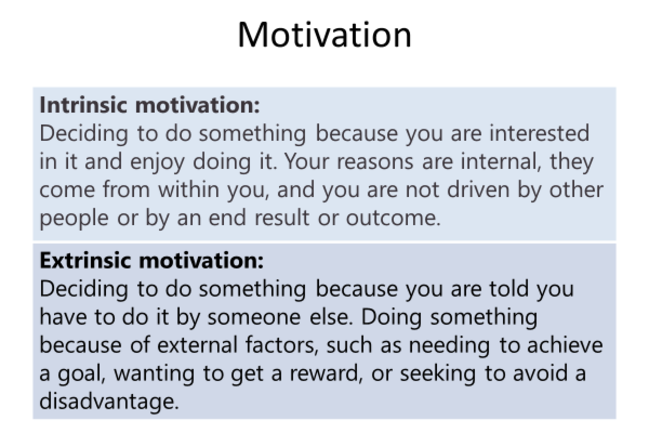


Self‐determination theory and work motivation. Keywords: Motivation Intrinsic Extrinsic Self-Determination Theory. As educators we have to question if is this a realistic expectation from learners or is a more business minded approach to nursing and it’s education needed?
EXTRINSIC VS INTRINSIC MOTIVATION NURSING FULL
The nurse educator’s focus will likely be on developing the nursing team and also that of personal development. A vocational profession such as nursing may have a culture where educators expectations are that of full commitment and enthusiasm from the learner’s end. The intrinsic and extrinsic motivations include the psychological needs for competence and autonomy. The interplay in understanding motivation between these intrinsic forces and the extrinsic motives is part of Self-Determination Theory. The student understands the value of the educational purpose. These extrinsic factors may deter, cause resentment and disinterest or they may alternatively be accepted of the value of the task and be externally ‘propelled into action’. Intrinsic rewards come from within the individual and include. External factors which lead to a separable outcome such as grades, rewards, or workplace/peer opinions. The fulfillment will result in some form of reward, which will either be intrinsic or extrinsic. “Intrinsic motivation results in high-quality learning and creativity.”Īutonomy for self-direction and also positive performance feedback provide opportunities for enhanced intrinsic motivation.Įxtrinsically motivators can vary between a positive or negative value. The motivation is in the relationship between individual and activity. It must be remembered that peoples intrinsic motivators vary depending on the task at hand. Feelings of competence provide part of the interpersonal development for intrinsic motivation. Intrinsic is seen as the ‘free choice’ in learning. These intrinsic motivations can elicit passions, creativity, and prolonged efforts to learn and explore. Intrinsic motivation comes from within the learner, activated by fun, interest and the challenge. “Intrinsic motivation remains an important construct, reflecting the natural human propensity to learn and assimilate.” “To be motivated, is to be moved to do something”. Motivation varies in terms of the kind of motivation, level of motivation and type of motivation. Contemporary educational psychology, 25(1), 54-67. Intrinsic and extrinsic motivations: Classic definitions and new directions. The motivation for education development will likely be different for each person depending on intrinsic and extrinsic factors. If we think about our motivation as a learner we may want to strive to be the best, obtain a qualification for career development purposes, to learn something or it may be a work requirement. However, reasons and motivation for studying nursing. Motivation of the learner and also to a lesser extent the teacher. Furthermore, extrinsic reasons have been found, such as being influenced by parents and friends 3. Reading through education theory a theme that emerges through the literature is that of motivation.


 0 kommentar(er)
0 kommentar(er)
